
What Are The Levels of Neonatal Care?
I. Introduction
If your baby is born with a lower birth weight than usual or develops any medical condition after birth neonatal care is essential for that baby. This special care from the best Neonatologist in Navi Mumbai is very important for neonatal babies because prematurity can cause many severe conditions. This effective process of care helps to lower the mortality rate, protect from infections and bacteria, and ensure the healthy development of newborn babies.
II. Levels of Neonatal Care
The entire procedure of neonatal care consists of several levels of caring including:
Level I: Well-Newborn Nursery
This is the basic level of care for healthy or slightly premature newborns who require minimal medical monitoring by pediatrics, nurses, and physicians.
Level II: Special Care Nursery
The second level provides treatment to babies who are moderately ill or born before the usual time. Level II generally requires more medical observation than those in Level I.
Level III: Neonatal Intensive Care Unit (NICU)
This level of neonatal care provides advanced treatment from the best Neonatologist in Navi Mumbai for severely ill babies with preterm birth. This level monitors critical treatment and maximum life support for those babies.
Level IV: Regional NICU
This is the ultimate level of neonatal care that offers highly specialized treatment for the most critical and severe cases. Level IV incorporates highly qualified doctors and experts to handle extremely severe conditions for babies.
III. Characteristics and Services of Each Level
Level I: Basic Care for Healthy Newborns
At this level, I provide basic monitoring to normal and healthy babies and those who are born a few times before normal birth. Pediatricians, doctors, and professional nurses look after the basic needs of babies such as feeding and physiological stability.
Level II: Care for Moderately ill or Premature Infants
Level II offers a higher level of care than level I along with continuous monitoring to provide respiratory support to underdeveloped immune systems, moderate illnesses for newborn babies, and infant ventilation or aftercare.
Level III: Intensive Care for Critically ill Newborns
The third level of neonatal care serves standard respiratory support and comprehensive care for severe medical conditions and excessive premature babies. Intensive treatment for critical illnesses and full-spectrum respiratory support is provided at this level.
Level IV: Highly Specialized Care for the Most Complex Cases
Level four of neonatal care is for specialized treatments and most complex cases for neonatal babies. NICU Hospital in Navi Mumbai provides intensive care and coordination with pediatric subspecialists.
IV. Factors Determining Level of Care Needed
Some factors like baby weighing after birth, gestational age, or other serious health conditions determine the level of your baby’s neonatal care:
Gestational Age:
Newborns born before the normal pregnancy duration require a special level of care for normal growth and a healthy future.
Birth Weight:
Babies born with low birth weight require more intensive monitoring and proper care.
Presence of Medical Conditions or Complications: Newborns with severe abnormalities, respiratory instability, infections, or other significant health issues require more specialized and standard care than others.
V. Conclusion
This specialized care is majorly important for ensuring the healthy life and viability of newborns. It is needed especially for those who are born before the gestational period or have severe medical complications. Understanding the different levels of neonatal care and the services provided at each level helps NICU Hospital in Navi Mumbai solve the specific needs of each infant, ultimately improving outcomes and supporting healthy development.

Early Symptoms of Brain Tumor
Brain tumours refer to unexpected growths originating from any part of the skull and could be malignant or benign. As in most diseases and sicknesses, the early diagnosis greatly helps in managing the disease. This article is meant to focus on some of the frequent early signs of brain tumors that should make one get medical assistance from a Cancer Specialist in Navi Mumbai.
Common Early Symptoms of Brain Tumors
This chronic headache is one of the first signs of brain tumor and can occur at any age. This is because a Cancer Specialist in Navi Mumbai may find a tumor when analyzing severe or frequent headaches or headache, which is different from other headaches.
Another symptom might be seizures, which would also indicate that one could have a tumor in the brain. Other forms of manifestations could be associated with seizures as a part of the picture that occurs with a brain tumour because this is a condition that can affect the normal functioning of the brain. Thus, only when a doctor was capable of detecting it in the initial stages, tumor removal treatment in Navi Mumbai is possible.
Cognitive and Personality Changes
Cognitive and personality changes may arise from a growing brain tumor as it begins to press on brain tissue. Problems with memory, concentration, multitasking or mood changes could point to a tumor. Family members often first notice subtle differences in thinking or behavior before the patient. Seeing a Cancer Specialist in Navi Mumbai can help identify if changes are caused by a brain tumor.
Less Common Early Symptoms of Brain Tumors
1) Vision Problems
Vision problems can sometimes be an early sign of a brain tumor, depending on its location. Issues like blurred or double vision, loss of peripheral vision or other vision changes need medical review, especially if they develop or worsen gradually over time. An ophthalmologist may refer patients for scans to check for an underlying tumor.
2) Balance and Coordination
Balance and coordination issues can arise if a tumor affects motor functions in the brain. Symptoms like dizziness, loss of balance or impaired hand-eye coordination warrant evaluation by a doctor. Neurological testing and scans may reveal a tumor that needs tumor removal treatment in Navi Mumbai for best outcomes.
3) Speech Difficulties
Speech difficulties can be subtle at first but warrant attention, as tumors in speech areas can impact verbal communication abilities over time if left unaddressed. Seeking care from a Cancer Specialist in Navi Mumbai can help identify if slurred or otherwise unusual speech may signal a brain tumor. Early detection increases options for treatment.
When to See a Doctor
Importance of seeking medical attention for persistent symptoms
Anyone experiencing persistent, recurrent or worsening headaches, seizures, cognitive or behavioral changes should see their primary care physician. Other focal neurological symptoms like vision, speech or coordination issues lasting more than a few days also require medical evaluation. It’s especially important to seek care if multiple, otherwise unexplained symptoms appear together or gradually over weeks to months.
Doctors will conduct thorough examinations and may order tests like blood work, MRI scans or other imaging to check for possible causes. While tumors are rare, detecting them early through evaluation increases chances of complete tumor removal treatment in Navi Mumbai by specialist doctors. Early care avoids potential complications from undiagnosed tumors.
Conclusion
Brain tumors can cause subtle symptoms in their early stages. It’s important not to ignore new, recurring or worsening neurological problems. Seeing a Cancer Specialist in Navi Mumbai ensures thorough assessment and testing that may uncover tumors at their earliest and most treatable phases. Early detection allows time for tumor removal treatment in Navi Mumbai before large size or complicated positioning impacts treatment options.
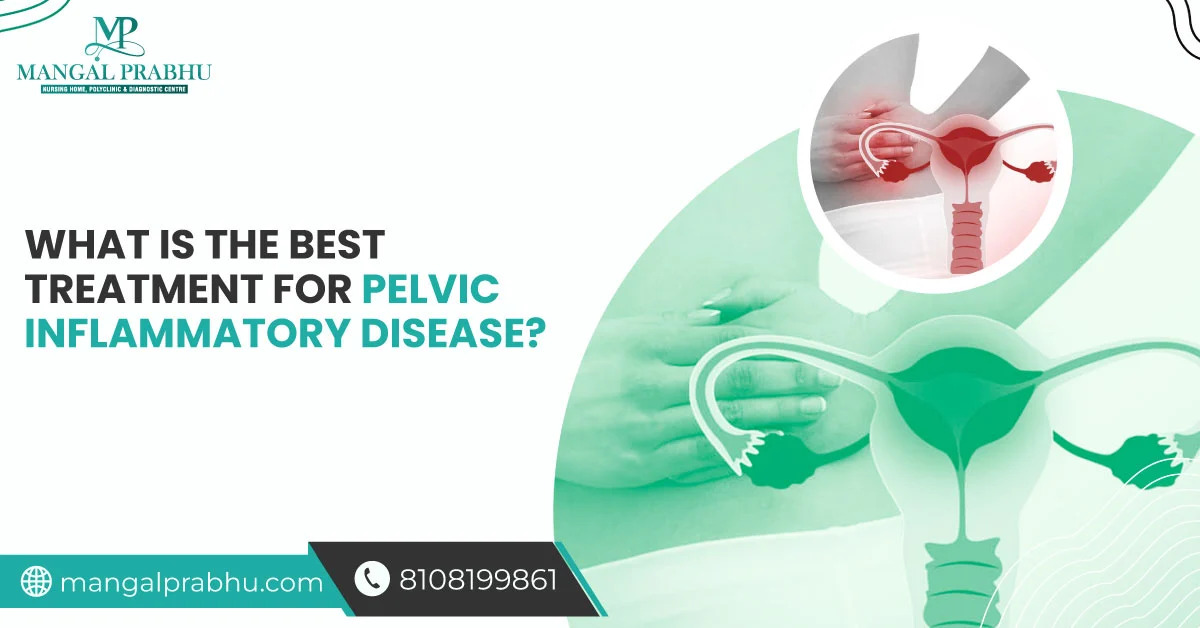
What is The Best Treatment for Pelvic Inflammatory Disease?
PID stands for Pelvic Inflammatory Diseases which is a severe type of infection that occurs to the organs found in the female reproductive system such as the uterus, fallopian tubes, and other similar ‘organs’. It is an inflammation of the reproductive tract commonly attributed to some infections getting into the tract especially sexually transmitted infections (STIs).
Specifically, PID being a severe condition that if not well treated on time leads to many other severe health problems on women. This post looks at the different methods that can be used in the treatment of PID and in essence emphasizes on the need to prevent the infection through practicing safe sex and having regular checkups with a gynaecologist.
Common treatment options for PID
A. Antibiotic Therapy
Antibiotic treatment is the widely recommended as well as the most efficient treatment of PID. This disease can be thoroughly managed through the prescription of antibiotics which is known to be the most effective treatment strategy. Antibiotics are drugs that help the body to fight against the conditions that cause PID.
Different antibiotics need distinct time and normally doctors give a pack of many antibiotics for two weeks to be completely effective in eradicating all bacteria. In majority of cases, proper courses of antibiotic treatment are needed, which is possible only with the help of a gynaecologist in Navi Mumbai.
As much as is needed, it is extremely crucial to stick to the complete often-prescribed course of antibiotic treatment.
B. Pain Management
In relation to the management of PID, pain killing is also a powerful tool that is used in the treatment process in conjunction with antibiotics. Nonsteroidal anti-inflammatory drugs or NSAIDs such as Ibuprofen may be prescribed to the patient in order to reduce inflammations while mild pain relievers may be used in case of mild pains and casual pains may be prescribed by a doctor as a prescription pain medicines.. Applying a hot water bag or hot fomentation on the lower abdomen sometimes offers comfort. A gynaecologist in Navi Mumbai can help assess the pain and suggest the right pain management approach.
Exploring alternative treatments for PID
A. Herbal remedies
Certain herbal remedies are sometimes used as a complementary treatment for PID. However, medical research evidence supporting their efficacy is still limited. Some herbs believed to possess antimicrobial properties and traditionally used for gynaecological issues are garlic, turmeric, and neem. However, combining herbal remedies with prescribed antibiotic treatment is best under a doctor’s guidance.
B. Physical therapy
Strengthening exercises such as gentle pelvic floor and abdominal exercises permitted by a physical therapist can alleviate the pain and soreness of muscular tissues caused by PID. Then, balanced and low-impact exercises such as walking and swimming can be resumed during the later phase of recovery. These should not, however, be used in place of medical treatment. It is most effective when used with medication by a gynaecologist in Navi Mumbai concerning antibiotics and painkillers.
Conclusion
while antibiotic therapy remains the primary treatment modality for PID, it is equally important to manage the associated pain and consider complementary therapies safely. However, prevention of STIs through safe sex and early screening during Pelvic Inflammatory Disease Treatment in Navi Mumbai is critical to avoiding PID and its potentially severe repercussions on reproductive health in the long run. Prompt guidance from an experienced gynaecologist is advisable for early PID diagnosis and most effective patient care plan suited to individual needs.
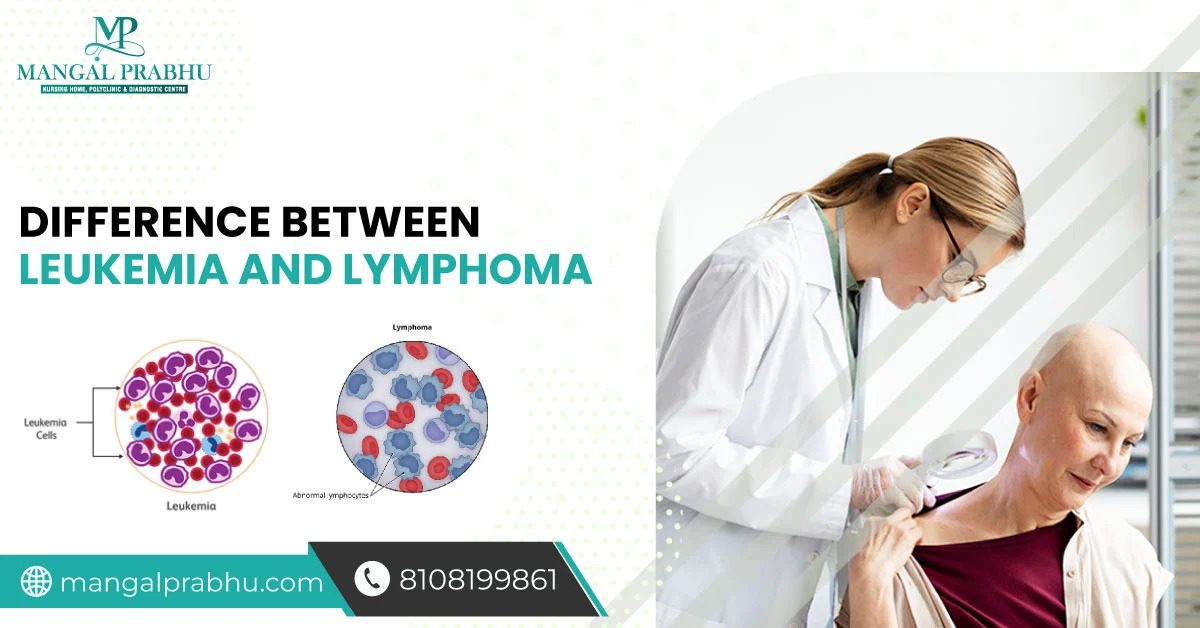
Difference Between Leukemia and Lymphoma
Cancers that involve the blood and bone marrow including leukemia and lymphoma. Despite their common origin in the cells that form blood, leukemia and lymphoma differ in various ways such as symptoms, diagnosis, and treatment options. By exploring these similarities and differences, this article will provide patients with knowledge about their specific kinds of blood cancer that can lead them to an appropriate Hematologist in Navi Mumbai.
Definition and Types
Leukemia commences in the bone marrow and causes an excessive growth of white blood cells known as leukocytes or leukemia cells. The primary distinctions lie in acute vs. chronic forms depending on which type of cells they affect: lymphocytes or myeloid cells.
Lymphoma occurs when there is proliferation of lymphocytes within the lymph nodes as well as other tissues that are found outside of bone marrow. The latter often presents with localized bands or sheets, while the former contains scattered cells among fibrous tissues or has a mixed cellularity pattern.
Causes and Risk Factors
People have still not known what causes both of these diseases before.Leukemia occurs when the genetic composition of the cells changes randomly while in Lymphoma, cases have been recorded where it was evident that certain infectious agents like Epstein Barr virus (EBV)and Human Immunodeficiency Virus(HIV)led to the disease.
Some individuals are more predisposed to these two infections due to age, and family lineage hence leading to a weaker body defence in fighting off infections as seen in these two illnesses.
Symptoms and Diagnosis
Fever, fatigue, bone/joint pain and frequent infections are the crucial symptoms of Leukemia. Other signs of Leukemia include an increase in malignant white cells in the blood because they destroy healthy cells inside their crowded zone.
Enlarged lymph nodes, weight loss, night sweats etc. are likely to be signs of Lymphoma depending on which part of the lymphatic system is under attack. Blood tests plus bone marrow biopsy, as well as several scans for an accurate diagnosis on the specific type of disease. Such tests can be administered by a Hematologist in Navi Mumbai.
Treatment Options
For each of the conditions above, treatment may include chemotherapy, immunotherapy, targeted therapy, radiotherapy or stem cell transplant depending on the cancer type and stage.
Leukemia/lymphoma cell death is brought about by some chemotherapy drugs used for chemotherapy administered over many months.
There are a brand new range of targeted therapies that attack particular changes found on some cells. The main focus of any treatment is getting rid of the disease while experiencing the least possible effects which would otherwise have been exterminating the patient.
Prognosis and Survival Rates
The prognosis is based on various other factors such as the kind of disease, the age of the person diagnosed with certain cancer among others in general each type has its own survival rates. For instance, patients seem to do better if they have leukemia than some forms of lymphoma.
Leukemia has a five-year survival rate of about 60% if totally treated whereas the one for Hodgkin’s disease is between 50 and 70%; for some non-Hodgkin’s, this goes down to 50%. Henceforth, when one completes treatment, it is essential to have follow-up visits with the hematologist at Navi Mumbai.
Conclusion
Though they come from the same source (cells) in the family tree of body production called blood, there are noticeable distinctions between Leukemia and Lymphoma with regard to health indicators hence how they are determined and perceived by doctors.
Survival chances could be boosted immensely provided that one is diagnosed with either of them earlier and treated according to one’s personal peculiarities by a seasoned Hematologist who does Leukemia and Lymphoma Treatment in Navi Mumbai. Regular screenings, good life habits and immediate medical care upon noticing something amiss have appreciable importance in averting their occurrence.
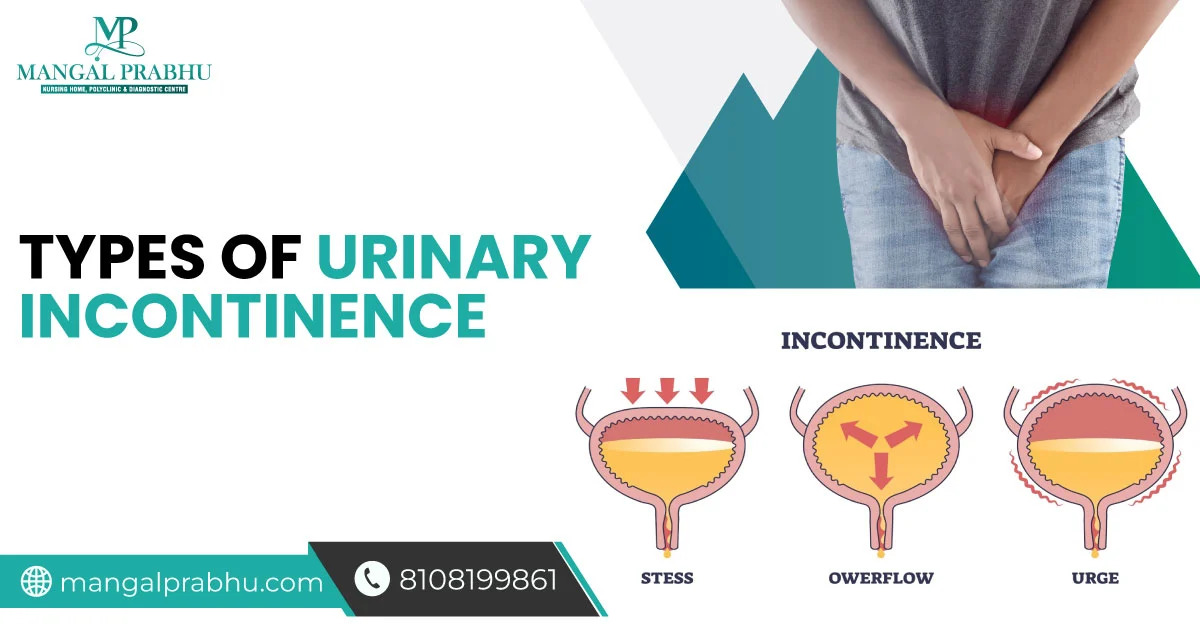
Types of Urinary Incontinence
Urinary incontinence is the unplanned loss of urine from the bladder. Various factors trigger it affecting all people. Expert treatment from a Urologist in Navi Mumbai usually resolves the condition in most cases. This article examines different types of urinary incontinence, their causes, symptoms, diagnosis and individualised treatment strategies that can offer respite from such distressful episodes.
Types of Urinary Incontinence
1) Stress Incontinence
One of the things that lead to stress incontinence is when you get physically involved in things like coughing and sneezing hence exerting force that goes to the bladder resulting in spillage; mainly found in girls.
2) Urge Incontinence
Conversely an urge incontinence condition comes about with a very high urgency followed by leakage, which can be associated with an instance of reflected bladder activity.
3) Overflow Incontinence
Overflow incontinence is the inability to completely empty your bladder during urination due to obstruction of urine passage each time.
4) Functional Incontinence
In the event that you have mobility problems for instance, you may experience what is referred to as functional incontinence mainly because of difficulties reaching the bathroom.
5) Mixed incontinence
A person has characteristics of both stress and urge incontinence. Many women have both types.
Causes, symptoms, and treatment options
Most frequently, stress incontinence results from giving birth or gaining weight leading to weakened pelvic muscles. A person may manifest signs like leaks when exercising or raising an object. Procedures like kegel exercises, pelvic floor physiotherapy, and support devices can ease this condition. People with urge incontinence usually suffer from either cystitis or hyperactive bladders. Signs of this disorder are frequent urgency in washing the vagina.
Behavior changes, medication, and nerve stimulation may help. Overflow incontinence may be due to an enlarged prostate gland in men. Symptoms are frequent dribbling. Treatment focuses on clearing blockages. Functional incontinence requires mobility aids and toileting assistance. Mixed incontinence requires managing multiple symptoms.
Diagnosis
Medical History, Physical Exams
To determine the probable type, the individual’s symptoms and medical history shall be looked at by a urologist in Navi Mumbai. The issues are examined on the bladder, urethra, and pelvic floor muscles.
Diagnostic Test Significance
Tests like bladder diaries, pad tests, and urine tests help clarify the diagnosis by measuring urine loss and checking for infections. Imaging scans show the bladder and organs. Urodynamics assesses bladder function using small tubes. Cystoscopy uses a thin camera to examine the bladder internally. Together these assist accurate diagnosis for correct treatment planning.
Treatment
Behavior Changes Medication, Devices, and Surgery.
Treating incontinence involves a customized plan by a urologist based on type and severity. Simple changes like limiting fluids before bedtime may help, along with pelvic floor exercises. Medications aim to relax or strengthen the bladder. Pessaries and catheters offer containment support. For severe cases, surgery restores bladder support or implants a sling or artificial urinary sphincter.
Customized Treatment Plans
The urologist will monitor the response and adjust treatment, which may involve a combination approach. Some need lifestyle modifications alone, while others benefit from medications, physiotherapy, or minor procedures in Navi Mumbai. Surgery is usually the last option. Following the plan helps manage symptoms long term for improved quality of life.
Conclusion
With the right understanding and treatment from an experienced urologist who do Urinary Incontinence Treatment in Navi Mumbai, incontinence need not control one’s life. Effective management is often possible with lifestyle changes, therapies, and modern options.
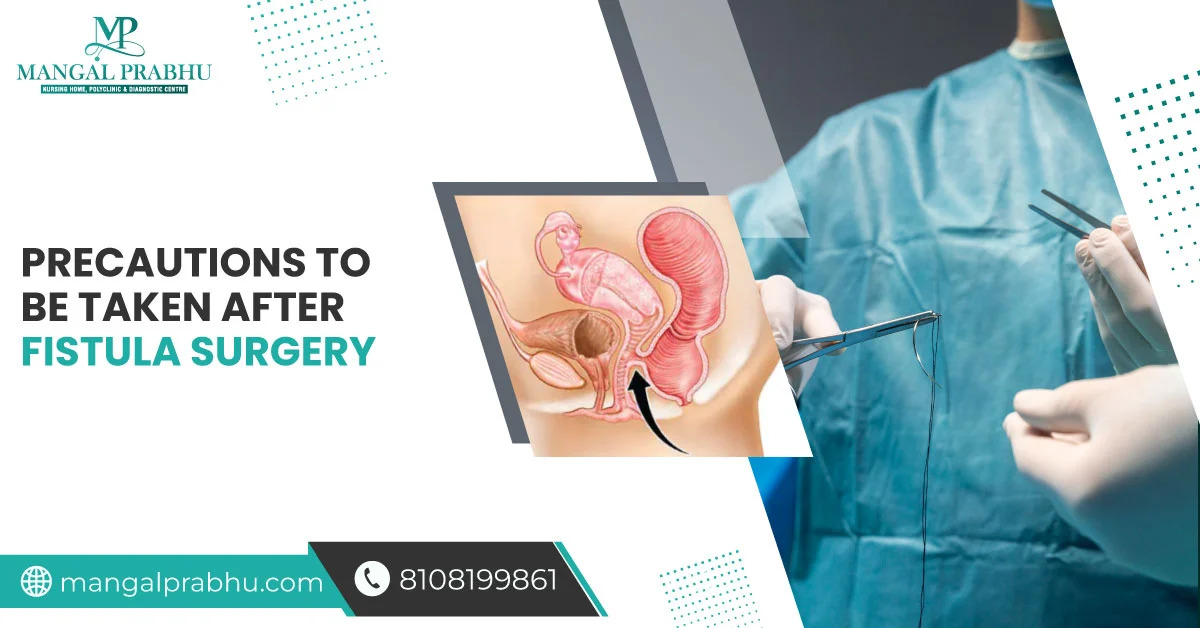
Precautions to Be Taken After Fistula Surgery
What is Fistula Surgery?
Surgery of fistula means that it is the treatment of diseases leading to the formation of pathways like fistulas. But there are some activities that need to be done by the patients who have undergone this surgery for them to gain their normal health back.
This article will focus on measures that should be taken by a patient who has undergone fistula surgery, being at home, proper rest, the activities that should be undertaken or avoided and next appointment with the surgeon.
Precautions to Be Taken After Fistula Surgery
a) How to Take Care
Do not cover the surgical area with clothing or bandages immediately after coming home and avoid washing the area for at least 48 hours. It is also important to change dressings or bandages where necessary as advised by the fistula treatment in Navi Mumbai. Ensuring one takes all medications properly and on time will help prevent the occurrence of an infection and facilitate faster recovery.
b) Physical Activity and Rest
Rest is critical after fistula surgery. Do not do any strenuous tasks for 4-6 weeks. Walking indoors is okay after a few days but avoid physical exertion. Get plenty of sleep and rest as advised by the surgeon to allow the healing process.
c) Wound Care
Check the wound daily for signs of infection like increased pain, redness or pus. Clean gently with antiseptic and apply any ointment as recommended. Avoid submerging the wound in water for 2-3 weeks. Contact the fistula surgeon in Navi Mumbai if you notice infection.
d) Bowel Habits
It is common to experience irregularity after surgery due to medications. Increase fibre and water intake. Warm fluids and walking may help. Gentle exercise like swimming can resume 4-6 weeks post-op. Contact the fistula treatment in Navi Mumbai doctor if no bowel movement for more than 3 days.
e) Follow-Up Appointments
Follow up with the fistula surgeon in Navi Mumbai as directed, usually after 1, 4 and 12 weeks. This is to check healing and provide further advice. Discuss any concerns at follow-ups for timely management. Early identification of issues allows problems to be addressed correctly.
f) Returning to Normal Activities
It takes 4-6 weeks to fully recover. Resume light chores at 3 weeks, driving at 4-5 weeks. Return to work when comfortable, usually 4-6 weeks depending on the job. Exercise and physical activity levels can be gradually increased over weeks under guidance of the fistula surgeon in Navi Mumbai.
g) Prevention of Recurrence
It is essential more often for all post-op measures and recommendations given by the fistula surgeon in Navi Mumbai to avoid formation of fistula again. Discourage poor bowel movements and unsanitary practices such as not washing for a long time. Inform your doctor about any symptoms of infection or non-healing as early management prevents recurrence.
Conclusion
Taking the recommended precautions after fistula surgery is key to healing properly and avoiding complications. Rest, medication, wound care, diet and lifestyle changes are important as per guidance of the treating fistula surgeon in Navi Mumbai. Following all advice and attending scheduled follow-ups helps ensure full recovery. For any concerns, one must contact the fistula treatment centre in Navi Mumbai without delay.

Understanding Migraine: Exploring the Reasons, Causes, Symptoms, and Treatment Options
Migraines are the most common and one of the worst headache types that can render a person virtually unable to cope with their everyday life. Join us to discover various causes, symptoms, and effective treatment methods which encompass medications, lifestyle changes, and alternative therapies in this enlightening article on migraine.
Understanding the Reasons behind Migraines
Migraines were thought to originate from changes in brain chemicals and the way the brain processes pain perception. An accurate explanation of why some people have migraines whereas others do not get them is yet to be discovered. It is supposed that migraines can be associated with families as a result of genetically based factors. A General Physician in Navi Mumbai can help uncover your specific triggers and personal risk factors through a comprehensive assessment.
Exploring the Common Causes of Migraines
One of the major reasons for migraines is the change in hormone levels, particularly for people with hormonal imbalances (like in the case of women during menstrual periods). Other triggers may be some selected types of foods like aged cheeses, processed meats, chocolate, caffeine withdrawal, strong odours, bright lights, loud noises, changes in the sleep pattern and stress as well as weather conditions. It is easier to prevent seizures in future with migraine suspect identification that is possible with the help of migraine treatment in Navi Mumbai.
Recognizing the Symptoms of Migraines
Migraine symptoms often begin 30 minutes to an hour before the actual head pain and can include visual disturbances like flashing lights, blind spots or visual loss in one eye. Other warning signs are mood changes, fatigue, nausea, vomiting, and increased sensitivity to light, sound and smell. Early detection is possible using a comprehensive assessment of symptoms following physician consultation in Navi Mumbai.
Treatment Options for Migraines: Medications, Lifestyle Changes, and Alternative Therapies
Various treatment options to reduce the rate/intensity and immediate relief of migraine are available. Over-the-counter painkillers or prescription abortive medications targeted to stop migraines at onset are commonly prescribed by a migraine treatment in Navi Mumbai.
Preventive medications and neuro-modulating drugs, lifestyle modifications including regular sleep, diet control and stress management also play a role. The skill is not in just picking the right ingredients, but the art is having the right combination which is attained with the help of an expert in which multiple medications are given simultaneously.
Conclusion
Migraines are a complex nervous ailment and can be handled efficiently by implementing a multimodal strategy with lifestyle alterations as a part of it, then migraine preventive therapies as well as treatment techniques specifically for an acute migraine attack as explained by a general physician in Navi Mumbai.
Recognition of factors that contribute to the development of attacks, definitions, causes and symptoms might assist in mitigating incidences and identifying attacks promptly, unlike some medications that may lose their effectiveness over time or cause side effects. Consistent treatment with regular checkups has a major use in improving the lives of patients with migraine over time, as can be expected with migraine relief.

Danger Signs of Pneumonia in Infants?
Newborns are vulnerable to respiratory infections such as pneumonia as their immune systems are weak due to their fragile lives. Looking for a professional consultant in paediatrics from the very beginning is the most crucial step that could be a preventive measure. This article guides the red alert signs and symptoms in infants that should be followed to book an immediate appointment with a qualified pediatrician in Navi Mumbai. Early diagnosis and treatment significantly decrease morbidity and mortality among paediatric pneumonia patients.
Common Symptoms of Pneumonia in Infants
Some common signs babies may demonstrate are coughing, wheezing, grunting while breathing, difficulty breathing, and high temperature or fever. In addition, symptoms such as poor appetite and low energy and activity levels may be observed in infants. If reported early and consulted by a paediatrician in Navi Mumbai, these symptoms can help cure the disease of Infants Pneumonia Treatment in Navi Mumbai more efficiently.
Red Flags and Danger Signs
Parents need to be observant of rapid, shallow breathing or a suffusion of bluish color, especially on the lips and fingertips. Coughing with a lot of retractions or with grunting sounds is also indicative of a serious condition. Infants show their tiredness through lethargy and struggling to wake up. Such symptoms should be taken as a cue to the parents to get the needed treatment from a pediatrician in Navi Mumbai for their kids immediately.
Immediate Actions to Take
The parent should immediately not hesitate to call for an ambulance or take the infant to the nearest hospital or clinic to consult a paediatrician. Providing the baby with relief like warming, sitting upright, and offering oral rehydration with fluids is essential for the baby to recover. Beware of drug operations without the doctor’s advice since they can do more damage than good. It is paramount to introduce infant pneumonia treatment in Navi Mumbai at present.
Prevention and Vaccination
Routine vaccinations recommended by Navi Mumbai paediatricians play a huge role in preventing pneumonia. These include pneumococcal and flu shots. Parents must also maintain hygiene and avoid overcrowding. Regular handwashing, cleaning toys and surfaces, and proper ventilation reduce transmission of infections requiring Infants Pneumonia Treatment in Navi Mumbai in the first place.
Conclusion
Paying attention to and detecting both mild and severe symptoms of pneumonia in infants early is the key to prompt treatment of the disease. To get the best possible outcome for a child suffering from pneumonia, you must consult a paediatrician with experience in this field. Parents and all the caregivers of the children living in Navi Mumbai should prevent and seek medical aid from a certified paediatrician immediately whenever any symptom appears for better results. After all, following the expert recommendations to keep myself clean and healthy helps the baby to stay far from sicknesses and complications.
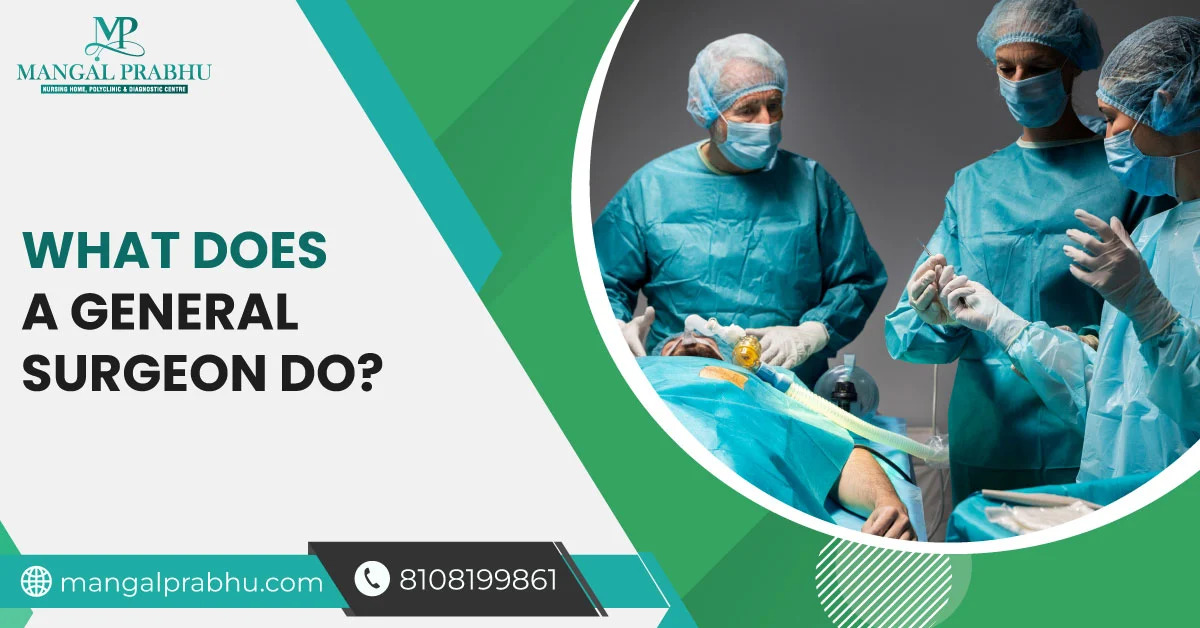
What Does a General Surgeon Do?
A general surgeon is a certified and licensed healthcare specialist who performs a wide range of surgical procedures. They are different from surgeons specializing in certain fields, like cardiologists (heart specialists), neurologists (brain surgeons), and oncologists (surgeons of cancer). These surgeons perform operations on the abdomen, gastrointestinal tract, musculoskeletal system, and other general body parts. So, when exactly do you need to see a general surgeon in Navi Mumbai, and what’s their role? Let’s find out.
The Role of a General Surgeon
A general surgeon is a specialist in many physical conditions that may or may not require surgical intervention. If they believe the condition is too complicated to be treated, they will refer you to a specialist for the particular disease. Here’s what they do:
a) Surgical Procedures Performed
An experienced surgeon can perform surgical procedures for a medical condition or a cosmetic purpose. They might choose open surgery or perform a laparoscopic procedure, which involves small instruments that give a clear picture of your internal organs. In addition, some general surgeons have embraced robot-assisted surgical procedures to ensure maximum precision and the best outcome with minimal risk of post-surgical complications.
b) Pre and Post-Operative Care
Post-operative care involves the follow-up treatment after a surgical procedure. The level of post-op care a patient needs depends on the type of surgery and their health status. A general surgeon will give detailed instructions regarding what to eat, avoid, and how to take care of the wound. They will also ask you to schedule follow-up appointments for post-operative care.
c) Patient Education and Counseling
You might see a general surgeon for a chronic disease, a severe illness, or a sudden accident. Based on your symptoms and health, they will recommend the most suitable medical treatment. Patient counseling is part of their job. They discuss the available treatment options and determine the most reliable plan that fits your condition.
Common Surgical Procedures Performed by General Surgeons
A general surgeon can perform a vast array of surgical procedures, including:
i) Appendectomy:
A surgery to remove an inflamed appendix. It’s an emergency medical condition that requires immediate removal of the appendix to save the patient’s life. The surgeon can perform it laparoscopically or choose an open surgery.
ii) Breast Surgery:
A general surgeon specializes in breast augmentation, reconstruction, reduction, removal, and lumpectomy. Breast surgery can be a part of a cancer treatment or a cosmetic procedure.
iii) Colorectal Surgery:
Colorectal surgery involves the treatment of your large intestine, i.e., rectum, anus, and colon. A general surgeon might perform a colorectal surgery if you are diagnosed with cancer of the colon and other parts of your large intestine, have polyps, or have inflammatory bowel disease.
iv) Hernia Repair:
A surgery hospital in Navi Mumbai has a general surgeon who can treat nearly all types of hernia. The surgery helps push the bulging hernia back into its original place and involves placing a mesh material that strengthens the weakened tissues.
From removing small skin lesions to performing surgery on the internal organs, a general surgeon does it all.

What is The Best Treatment for Bladder Leakage?
The feeling of urgency to urinate can be quite embarrassing, especially when you are in a public place. It often occurs in people diagnosed with urinary incontinence, a medical condition that makes it difficult for the patient to hold their urine.
It can be caused by pelvic floor diseases, during pregnancy and childbirth, and due to an enlarged prostate (to name a few). You must see a urologist in Navi Mumbai to pinpoint the exact cause of urinary incontinence and choose a treatment that suits your needs and health.
Causes and Risk Factors of Bladder Leakage
The causes can be temporary, such as pregnancy or a chronic medical condition. Sadly, the symptoms last until the root cause is treated. Here are the short-term and long-term causes of bladder leakage:
- Pregnancy: The weight of the baby plus your uterus pressing your bladder down can make it hard to hold urine, thus causing bladder leakage. The symptoms resolve after delivery.
- Urinary Tract Infection: A UTI is an infection of the bladder and kidneys. Your doctor will prescribe antibacterial medication to treat it.
- Diabetes: Diabetes increases your urine frequency, increasing the risk of bladder leakage.
- Menopause: Your pelvic floor muscles get loose and weak during menopause. This affects your bladder function and can lead to urinary incontinence.
Symptoms of Bladder Leakage
The common symptom of bladder leakage or urinary incontinence is the uncontrollable urge to urinate and the leakage of urine (in small amounts or large volumes). This can be occasional or regular, depending on the cause. You might notice the leakage when coughing, sneezing, laughing, or when you are engaged in physical exercises or sports.
Treatment Options for Bladder Leakage
Treatment for urinary incontinence depends on the underlying cause. Your doctor might recommend a combination of treatments to relieve your symptoms.
1) Lifestyle Changes
Sometimes, incontinence occurs because of certain lifestyle habits. For instance, drinking certain beverages in larger than recommended dosages or taking certain medications can cause bladder leakage. Changing these habits can help relieve your symptoms. Moreover, practicing pelvic floor muscle exercises can strengthen your pelvis and improve bladder function.
2) Medications
Medication helps relax your bladder and improves its ability to hold more urine. It also helps empty your bladder at once, so you need fewer trips to the washroom. Anticholinergics are commonly used to reduce urge incontinence. Other medications that may help are alpha-blockers, topical estrogen, and mirabegron.
3) Surgery
If the noninvasive urinary incontinence treatment in Navi Mumbai fails to deliver results, you might require a surgical procedure. A sling procedure involves placing a mesh under your urethra.
It prevents urine leakage due to stress incontinence. If the incontinence is caused by pelvic organ prolapse, surgery to fix the prolapse plus a sling procedure is required to treat the incontinence.
Conclusion
Urinary incontinence occurs because of an existing medical condition or an underlying issue that makes your bladder too weak to hold urine. Talk to your urologist about different treatment options. They will help you identify the best procedure for urinary incontinence based on the underlying cause and your health.
